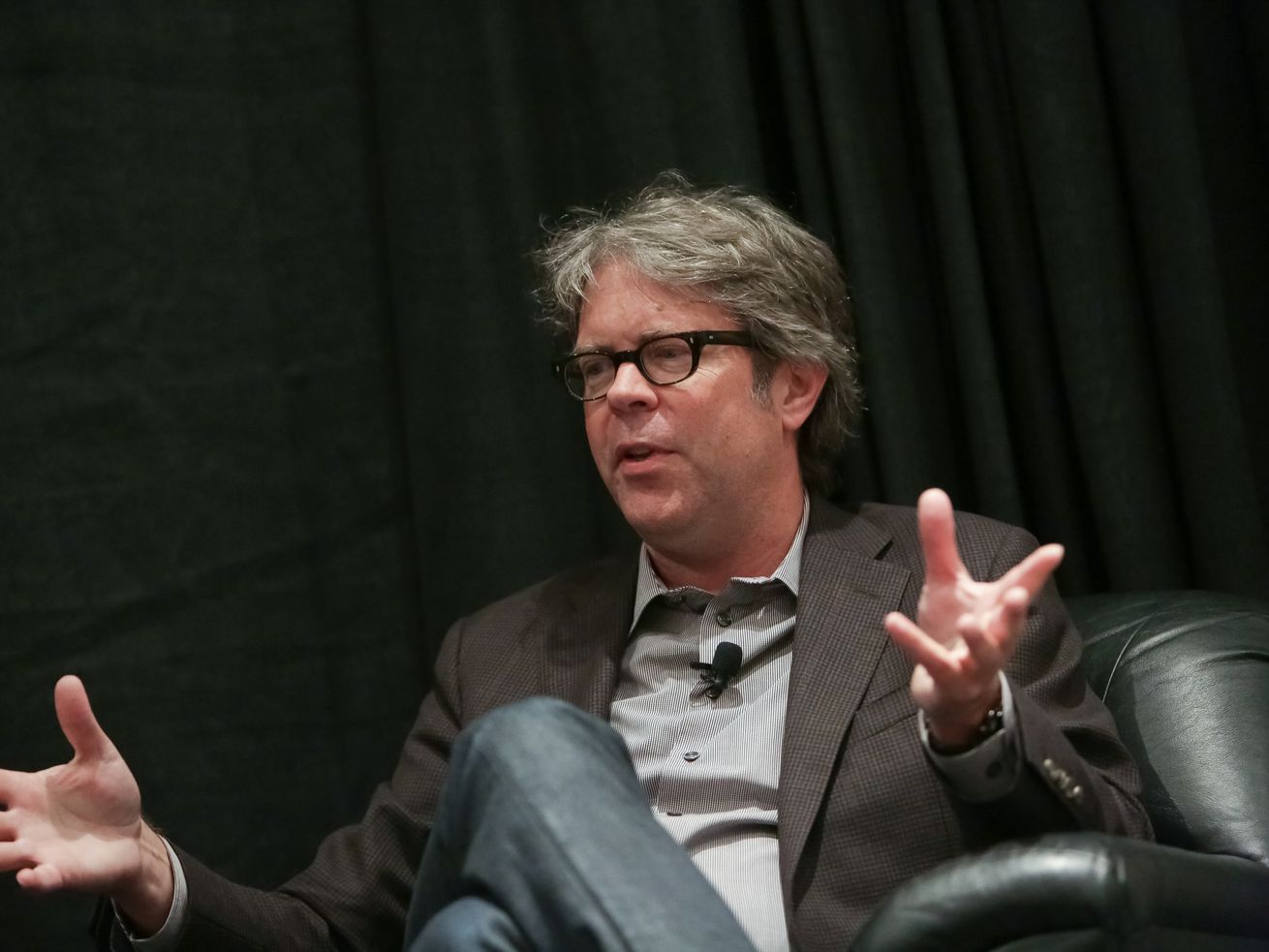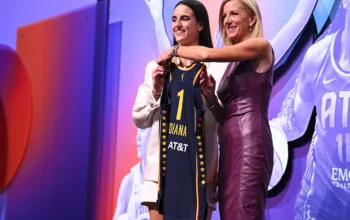Oprah, Franzenfreude, and Iraqi war orphans: a history of Jonathan Franzen’s controversies.
Jonathan Franzen, the novelist who has been lauded and reviled as few figures in contemporary American letters ever are, has a new book out. Which means it is time, once again, for one of the book world’s favorite pastimes: disseminating Jonathan Franzen thinkpieces.
Jonathan Franzen has flourished crankily under controversy since 2001, when two big things happened to him. First, he released his breakout novel The Corrections and became known as one of the most important American writers of his generation. Second, he said he was uncomfortable with Oprah selecting The Corrections for her book club because she’s picked a lot of schmaltz, and became synonymous with the worst of elitist white male snobbery.
Since then, Franzen has been named, variously, the Great American Novelist, a noted crank, a human Banksy installation, and simply kind of a prick. He has been embroiled in fights about Twitter (he says it is everything he opposes), birds (he likes them), and conjunctions (pro-and, anti-then). The internet domain ciswhitemale.com redirects to Franzen’s Facebook page. He’s released some of the most celebrated novels of the 21st century so far, and some of the most despised essays, too. He is singular: a novelist-slash-public intellectual, and very much deliberately so, in a time when that career path doesn’t seem to exist for many people anymore.
Here is a history of Jonathan Franzen’s career of controversy in four book releases — and why the release of his new novel is poised to meet a more welcoming atmosphere than the one that met his last.
2001: The era of The Corrections and Oprah
The Corrections was not Jonathan Franzen’s first novel; it was his third. But its publication marked the first time that one of Franzen’s book releases would become an Event.
“If some authors are masters of suspense, others postmodern verbal acrobats, and still others complex-character pointillists, few excel in all three arenas,” began the Publishers Weekly review. “In his long-awaited third novel, Franzen does.” The review closes by announcing The Corrections to be “simply, a masterpiece.”
Publishers Weekly wasn’t alone in its praise. The Guardian called The Corrections “a Bleak House of the digital age.” In the New York Times, Michiko Kakutani called it “by turns funny and corrosive, portentous and affecting.” By the end of the year, it would win the National Book Award.
What was so impressive about The Corrections for many readers was the way Franzen managed to marry pyrotechnic literary ambitions to an immersive, highly readable family saga. It was a strategy Franzen had famously argued in a 1996 essay in Harper’s was the best possible step forward for the novel. TV had made the big novel of social consciousness redundant, Franzen said, and the serious post-modern novelists like Thomas Pynchon and Don DeLillo were rapidly becoming irrelevant. To write a novel that mattered in the fast-approaching 21st century, he concluded, a novelist would have to “connect the personal and the social” by rooting social critique in psychologically compelling characters.
There are basically two opposing models of the novel, Franzen would later elaborate in a much-celebrated 2002 essay for the New Yorker. There’s the Status model, in the tradition of Flaubert, in which if a book is great then it’s high art, and if the public doesn’t get it, well, that’s because they’re philistines, isn’t it. Then there’s the Contract model, in which the author is understood to have made a contract with the reader: In exchange for the reader’s attention, the author gives pleasure. If the public “doesn’t get” a Contract book, then it doesn’t matter whether it’s high art or not; the Contract book has failed.
Franzen, nervously, could not seem to quite decide which model he aligned with. He sort of seemed to want to do both. With The Corrections, the critical consensus was that Franzen had pulled it off.
Put very simply, The Corrections was both smart and fun. Or as David Gates winkingly phrased it in the New York Times, “You could read The Corrections as a conventional realist saga … with just enough novel-of-paranoia touches so Oprah won’t assign it and ruin Franzen’s street cred.”
Gates either spoke too soon or was a time traveler with a morbid sense of irony. A mere two weeks after Gates’s review was published, Oprah announced that she had, indeed, picked The Corrections for her book club, and Franzen did, indeed, clutch frantically after his street cred.
His main issue, he said on NPR’s Fresh Air, was a fear that the Oprah seal would push readers to focus in on just the fun part of his fun-smart alliance. “I feel like I’m solidly in the high-art literary tradition,” he said, “but I like to read entertaining books and this maybe helps bridge that gap, but it also heightens these feelings of being misunderstood.”
In an interview with Powell’s bookstore, Franzen returned to the question of whether Oprah’s taste was good enough that he should be flattered by the attention. “She’s picked some good books, but she’s picked enough schmaltzy, one-dimensional ones that I cringe, myself,” he said, “even though I think she’s really smart and she’s really fighting the good fight.”
With icy politeness, Oprah extended Franzen a disinvitation. “Jonathan Franzen will not be on the Oprah Winfrey show because he is seemingly uncomfortable and conflicted about being chosen as a book club selection,” she said in a public statement. “It is never my intention to make anyone uncomfortable or cause anyone conflict. We have decided to skip the dinner and we’re moving on to the next book.” Franzen was the first author ever to be disinvited from Oprah’s show.
At the time, Oprah was one of publishing’s kingmakers. She was not considered a bastion of good taste — one editor, when asked by the New York Observer if publishing as a whole respected Oprah’s literary acumen responded, “Not really” — but she was considered the most reliable publicity outlet in the business. Her Oprah’s Book Club picks regularly sold over a million copies. When she made Anna Karenina an Oprah book, publishers announced that they were printing 800,000 additional copies.
So the book world responded to the Franzen-Oprah affair with mingled scorn and delight. Franzen was such a snob that he was going to tell anyone who asked how uncomfortable he was putting the Oprah seal on his book, but he was enough of a hypocrite that he was willing to use her name for publicity even so? What a jerk.
“One would have to be a better person than me not to be amused by this whole drama,” Bill Thomas, editor-in-chief of Doubleday, told the New York Times.
Part of what gave the Oprah saga such legs was the way it illuminated the uneasy underbelly of the smart books/fun books split that Franzen was attempting to bring together. Subliminally speaking, smart books of the era were considered men’s books. Fun books were considered women’s books. Generally, only men were believed capable of uniting the two.
“As male novelists abandoned psychological realism for oracular pronouncements,” the New York Times explained in a long, breathless profile of Franzen shortly before The Corrections came out, “the job of creating memorable characters became women’s work — the forte of writers like Anne Tyler and Annie Proulx. Franzen aims to bring these traditions together.”
Oprah’s seal of approval threatened Franzen’s street cred not only because she was unserious but because she was feminine. “I had some hope of actually reaching a male audience,” Franzen said on Fresh Air, “and I’ve heard more than one reader in signing lines now in book stores that said, ‘If I hadn’t heard you, I would have been put off by the fact that it is an Oprah pick. I figure those books are for women and I would never touch it.’ Those are male readers speaking.”
Franzen would later apologize profusely and repeatedly for offending Oprah. But with this feud, Franzen’s villain story was set. He would be, for the next 20 years, the man who represented the straight white male establishment of literary culture and all its most snobbish excesses.
2010: Freedom and Franzenfreude
Despite the Oprah scandal, Franzen had earned enough goodwill with The Corrections that he was, by and large, more admired than despised in the book world when he released his fourth novel, 2010’s Freedom. Just like The Corrections, Freedom was greeted with critical jubilation.
Time magazine put Franzen on the cover under the headline Great American Novelist. The New York Times called Freedom “a masterpiece of American fiction.” Then-President Obama was photographed reading it on vacation before it even came out. In a redemptive moment, Oprah selected Freedom for her book club, and Franzen appeared on the show, telling Oprah it was “an honor.”
But as Jennie Yabroff pointed out in Newsweek, while readers were willing to welcome Freedom with open arms, Franzen the public person had come to seem more than a little tiresome. The success of The Corrections had given him a platform, and Franzen had not held off on using his to espouse some fairly controversial takes.
“There’s no getting around the fact that Freedom comes with an ever-expanded set of baggage,” Yabroff wrote. “The Corrections was written by a fairly unknown, earnest-looking guy with glasses. Freedom comes from the man who dissed Oprah, complained that the Tony-winning musical Spring Awakening was a bastardization of the 1891 Frank Wedekind play (which Franzen himself had recently translated from the German), called book critic Michiko Kakutani ‘the stupidest person in New York,’ and claimed such affectations as writing in an earmuff-and-blindfold-equipped sensory-deprivation chamber.” (All links added.)
Where things really started to change, though, and Franzen’s crankiness went from annoyance to outright liability, was with the Twitter hashtag Franzenfreude.
The hashtag began with a conversation about the outsize coverage Freedom was enjoying from outlets like the New York Times, and how they compared to the coverage that women authors received.
“NYT raved about Franzen’s new book,” tweeted women’s fiction author Jodi Picoult. “Is anyone shocked? Would love to see the NYT rave about authors who aren’t white male literary darlings.”
“Count the reviews, interviews, profiles and essays by/about writers like G. Shteyngart, C. Bock, J. Safran Foer the NYT pubs,” added women’s fiction author Jennifer Weiner. “Now try to find a woman who’s gotten that kind of attention. NYT loves its literary darlings, who tend to be dudes w/MFAs.”
Before long, Weiner had coined a catchy term for her discontent. “Schadenfreude is taking pleasure in the pain of others,” she said. “Franzenfreude is taking pain in the multiple and copious reviews being showered on Jonathan Franzen.”
The ensuing Franzenfreude conversation was more nuanced than many angry tweets would suggest, focused on whose voices the culture values and why. Ultimately, it would lead to the creation of VIDA Count, an annual data report that looks at the gender breakdown of the books covered at a given publication as well as the bylines at the publication itself. VIDA confirmed that Weiner and Picoult had identified a real problem: Book review outlets like the New York Times really were more likely to spend their time and resources on white male novelists like Franzen than on books by people from other backgrounds.
Meanwhile, Franzen, the man with his name in the hashtag, came to seem like a symbol of the problem: a white man with all the literary credibility in the world, a white man who had literally been declared the great American novelist while so many other great writers labored in comparative obscurity. He even had the same name as the other white men the New York Times loved at the time: Jonathan Franzen right up there with Jonathan Lethem and Jonathan Safran Foer. They were the lit world’s precursor to the Hollywood Chrises. Surely there should be as much coverage for marginalized writers as there were for all the Jonathans of Brooklyn?
It was becoming gradually clearer that the binary so many people used when they talked about Franzen, the binary between fun books and serious books, was a gendered one. Franzen was perceived as part of the system that made it that way — and he was a snob to boot.
Franzen did not help defend himself against the allegations of snobbery when he eventually responded to the charge in 2015. Jennifer Wiener, Franzen said in an interview at Butler University, was “freeloading on the legitimate problem of gender bias in the canon, and over the years in the major review organs, to promote herself, basically.” He agreed that mainstream outlets should review more women, he said, but he had a caveat: “It’s an important issue and she’s an unfortunate person to have as a spokesperson.”
But by then Franzen was already deep in what would become his most damaging book tour yet.
2015: Purity and adopting an Iraqi war orphan
Franzen’s next novel Purity wouldn’t come out until five years after Freedom, but he published multiple essays in the interval. They mostly served to strengthen the Franzen-as-villain narrative. Even the most dedicated fans of Franzen’s novels will usually admit that his essays are insufferable: paranoid, accusatory, reactionary to the point of cliché, and appearing with much more frequency than the novels.
In 2012, he published a New Yorker essay on Edith Wharton that lingered with such determination on the question of her attractiveness or lack thereof that it powered an entire internet backlash cycle. The Center for Fiction declared Franzen’s tone “extravagant, contemptuous and condescending,” while a more Franzen-friendly piece at the Awl suggested that Franzen “projects his own responses onto ‘us’ in a way that can be irritating, if we disagree with him.”
In 2015, Franzen published another New Yorker essay arguing that the bird-conservation-focused Audubon Society was spending too much of its energy focused on climate change, leading the public to ignore other forms of conservation, such as changing the kind of glass used in stadium walls. (Franzen is famously a bird lover, and birds are one of the subjects on which he is most likely to be an insufferable crank.)
“It’s not clear what the Audubon Society did to piss off Jonathan Franzen,” wrote Mark Jannot for the Audobon Society in response, going on to note Franzen’s lack of journalistic background, along with his “casual snark” and “smug, belittling tone.” The larger blogosphere received Jannot’s piece with overwhelming approval: Audubon, the consensus was, had won this one.
Five months later, Franzen released Purity, the first of his novels since The Corrections to be met with less than rave reviews. Critics all thought it was basically good, but they had reservations; they found the prose too bland, the plot too farcical, the treatment of feminism too willfully perverse.
Meanwhile, as Franzen made the rounds of promotion, he dropped one terrible quote after another into the avidly waiting arms of the lit world. Most infamously, he told Slate that he rarely wrote about race in part because “I have never been in love with a black woman,” and the Guardian that he had considered adopting an Iraqi war orphan to try to understand young people better. (That last one seems to have been a very bad attempt at a joke.)
Was Franzen the owner of some deeply problematic views on top of your average run-of-the-mill atmospheric racism and sexism? No one could necessarily prove it. Yet “misogyny seems to follow him like a cloud,” Bustle mused; “even if you don’t know about his exploits, you catch a whiff of them when he passes by.”
Was he maybe just really bad at expressing himself in any form besides the novel? “That Franzen’s opinions — expressed in forms, very much including the essay, that he has not mastered and that tend to serve him poorly — so often go against the contemporary grain (for instance his distrust of social media) or situate him squarely in a trainspotterish cul de sac of hobbyism (all that birdwatching) mean that he is, from the point of view of the virtue-signalling culture warriors of Twitter, a soft target,” argued the Dublin Review. “Here, once again, Franzen may have to take some of the blame. It’s difficult to think of another contemporary novelist who is served so poorly by out-of-context quotation, or by his own inability to craft acceptable soundbites.”
/cdn.vox-cdn.com/uploads/chorus_asset/file/22907666/183175455.jpg) Slaven Vlasic/Getty Images for The New Yorker
Slaven Vlasic/Getty Images for The New YorkerIn any case, Franzen did himself no favors by allowing himself to be photographed doing air quotes at the New Yorker Festival in 2013, thus giving every outlet reporting on his bad quotes a perfect illustration for its subsequent article (this outlet very much included). It was just too perfect for the image that all those soundbites and essays had coalesced into: someone painfully out of touch but so very willing to bore his audience to tears with his irrelevant opinions regardless.
It all culminated in a New York Times magazine profile by the great profiler Taffy Brodesser-Akner. A far cry from the breathlessly admiring Times profile that had accompanied the release of The Corrections, Brodesser-Akner’s piece treats Franzen as an oblivious grump whose clear talent as a novelist pales besides his raging anger issues and lack of self-awareness.
“What had he done that was so wrong?” Brodesser-Akner wrote, in Franzen-esque free indirect discourse.
“Here he was, in his essays and interviews, making informed, nuanced arguments about the way we live now — about anything from Twitter (which he is against) to the way political correctness has been weaponized to shut down discourse (which he is against) to obligatory self-promotion (which he is against) to the incessant ending of a phone call by saying, ‘I love you’ (which he is against, but because ‘I love you’ is for private) — and though critics loved him and he had a devoted readership, others were using the very mechanisms and platforms that he warned against (like the internet in general and social media in specific) to ridicule him. Hate-pieces, mean hashtags, reductive eye-rolling at his various stances, a nit-picking of every quote. Accusations that he is willing to pontificate but not to listen. Accusations that he’s too fragile to face his accusers! Him! Too fragile!”
The establishment had spoken. Franzen wasn’t their guy anymore. His persona had at last outweighed his work.
2021: Does Crossroads see Franzen at a … crossroads? (Look, unlike Franzen, I am making no claims toward literary genius here.)
The publication of Crossroads is not an Event in the way the publication of The Corrections and Freedom were, but it’s not being treated as disposable in the way Purity was either. Crossroads is getting great reviews.
The Atlantic declared it Franzen’s best book yet. Crossroads “does everything a great novel should do,” said Slate, urging readers to “forget all of the controversies and just read it.” The New York Times concluded that Crossroads was “warmer than anything he’s yet written, wider in its human sympathies, weightier of image and intellect.” (I myself declared it excellent.)
“Thank God for Jonathan Franzen,” sighed the Washington Post.
Moreover, Franzen is receiving uncharacteristically great notices on his press tour this time around. Most notably, he explained why he didn’t sign last year’s infamous Harper’s letter, an open letter that ostensibly argued for free speech, but with a fair amount of suggestion that the real problem is that people from marginalized groups have gotten too loud about challenging institutional biases.
“I felt it could be construed as somehow an attack on Black Lives Matter at a moment when that was just not the thing to do,” Franzen said. “There’s a chilling of nuanced discourse …but I also think, until people start being sent off to Lubyanka for having said the wrong thing to the wrong person, the risk is probably overblown.”
If anything was bait for a noted crank who’s been used as a symbol for those very institutional biases that people get loud about trying to knock down, the Harper’s letter was. So the fact that Franzen declined to sign it, and cited his support of Black Lives Matter in his explanation, felt significant.
Franzen is handling this press tour a lot better than his last. (No Iraqi war orphan jokes so far!) Yet to a certain extent, the literary internet was already prepped to receive a Franzen tour with a more welcoming spirit in 2021 than it was in 2015.
In the wake of the 2016 election, the most fashionable attitude to take on social media is to hate social media, and so Franzen’s vocal disdain toward Twitter and Facebook has come to seem more aspirational than anti-democratic. But more importantly, the movement to include voices besides those of white men in the literary conversation has evolved beyond the need for symbols like Franzen.
In part because of the conversation begun by #Franzenfreude and VIDA Count, literary journals have moved toward covering the work of marginalized authors. They are still nowhere near parity, but by now the conversation has developed enough nuance that most people are comfortable aiming their critique at systems and gatekeepers rather than at individual authors like Franzen.
And as the critics of the world work to disentangle the concept of “good art” from the default of the straight white male, and simultaneously begin a backlash against the poptimism that dominated the 2010s, snobbery is swinging back into fashion. It’s cool to have very discerning taste again, as long as your discerning taste spans genres and genders and categories of identity.
Within this evolved conversation, Franzen is freed from the obligation to be either the Great American Novelist or a regressive symbol of the status quo. He can just be a guy who writes really good novels and really bad essays and is terminally offline. At long last, Franzenfreude might finally die.
Author: Constance Grady
Read More



